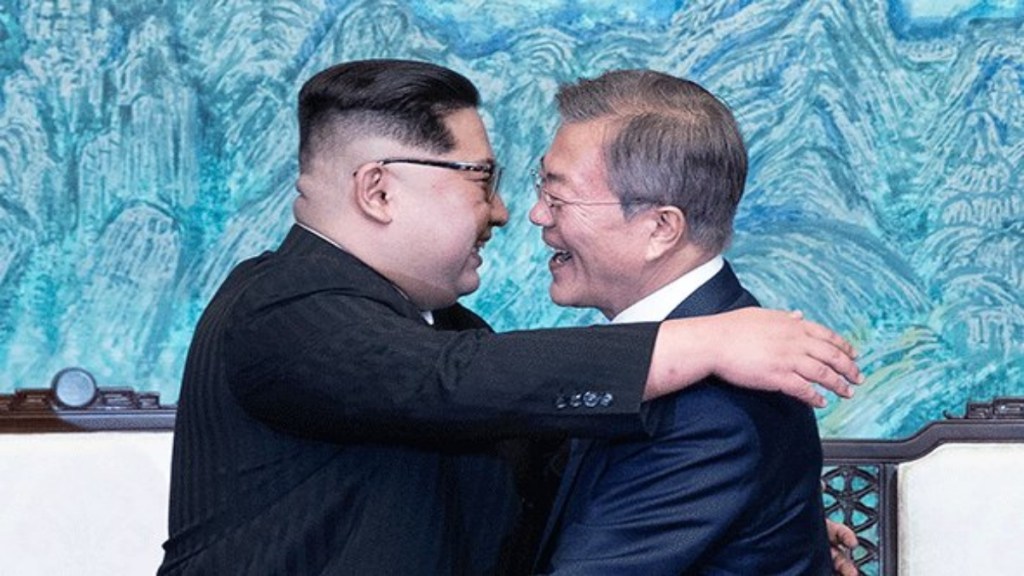Amidst escalating tensions in the Korean Peninsula, South Korea has taken a significant diplomatic manoeuvre by restructuring its approach towards North Korea. Formerly known as the ‘Bureau of Korean Peninsula and Security Affairs,’ the department has been renamed as the ‘Diplomatic Strategy and Intelligence in Korea Office.’
This strategic move follows North Korea’s dissolution of the committee aimed at peaceful unification with Seoul, with Kim Jong Un signalling a shift towards a more aggressive stance. The bureau, established in 2006 under the Ministry of Foreign Affairs, was originally tasked with seeking diplomatic solutions to North Korea’s nuclear program and fostering peace.
However, repeated provocations and ballistic missile tests by Kim Jong Un’s regime have strained relations between the two nations. The recent deployment of a US nuclear submarine to Busan further exacerbated tensions, prompting South Korea’s response.
Background
In the year 2018, after the historic ‘Korea Summit’ between Kim Jong Un and the then President of South Korea Moon Jae In, relations between the two countries seemed to be improving. After this conference on the very sensitive border ‘DMZ’ i.e. Demilitarized Zone between the two countries, peace remained only for a short time.
Although South Korea never planned to make nuclear weapons in competition with North Korea, Kim Jong got enraged when the US nuclear submarine reached Busan port (South Korea) last year. Kim Jong, who has made a comeback on the strength of countries like China and Russia, threatened both America and South Korea of facing serious consequences of such action.
According to strategic experts, the situation in the Korean Peninsula is the most critical in the last 70 years. In the 50s, there was the ‘Korean War’ (1950-53) between North and South Korea, which were once a united country. After three years of this war, a ceasefire was reached with the mediation of the United Nations, but the tension continues till today.
Recently, Chang Jae-bok, Korean Ambassador to India had said in response to media queries that Kim Jong keeps testing nuclear weapons and ballistic missiles “to maintain his power”. Also, regarding South Korea’s production of nuclear weapons, the ambassador had said that “the opinion of the people of his country is divided regarding this, but his personal opinion is that nuclear weapons are not suitable for any country.”
Expert View
Sharing his views with Financial Express Online, Neeraj Rajput, Editor in Chief of Final Assault and a Senior War-journalist said: “Post Korean Summit which was held at DMZ in April ’18, a relatively peaceful situation has ensued in the (Korean) Peninsula. But, soon after North Korea and dictator Kim Jong Un again resorted to ballistic missile tests and provocative acts on DMZ. This led South Korea to ‘welcome’ a US nuclear submarine for the first time on one of its ports (Busan). US Nuclear submarine in Busan really perturbed Kim Jong who considered America as bete noire.”
Rajput, who is the only Indian war correspondent to have done ground reporting from the Korean Peninsula explained: “The relations between two Korean countries, which were already bitter, thus took a deep nosedive and Kim Jong disintegrated a committee formed by North Korea for the peace process with its Southern counterpart. In retaliation, South Korea also disbanded the Bureau of Peace and Korean Peninsula which was formed way back in 2006 for peace efforts with North Korea under the Foreign Ministry. With both the Korean countries disbanding their respective peace departments, the chances for the peaceful resolution of the affairs of the Peninsula seems bleak now.


